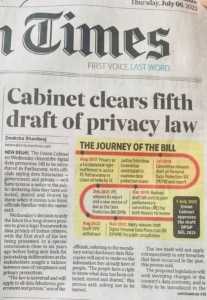How could the UCC Impact the Education Sector in India? 2023
Abstract
The Uniform Civil Code (UCC) is a proposed set of laws that would apply to all citizens of India, irrespective of religion or caste. The UCC has been debated for many years, with some arguing that it would be necessary to ensure equality for all citizens while others argue that it would interfere with religious freedom.
If implemented, the education sector is one area where the UCC could significantly impact. For example, the UCC could change schools’ curricula, teaching practices, and admission policies. It may also lead to changes in how schools are funded and regulated.
Some of the potential implications of the UCC on the education sector include:
- Increased access to education: The UCC could help increase education access for all citizens, regardless of religion or caste, as this is expected to remove some of the legal barriers that currently prevent people from certain groups from attending school. For example, some personal laws allow for child marriage, which can prevent girls from getting an education. A UCC could set a minimum age for marriage, which would help ensure that all children can complete their education.
- Improved gender equality: The UCC could also help to improve gender equality in education and ensure that women have the same rights as men in matters such as inheritance and property ownership. This could lead to more women being able to afford to send their children to school and give women more financial independence, making them more likely to pursue their education.
- Reduced discrimination: The UCC could help to reduce discrimination in education. It would set standard rules for all citizens, regardless of religion or caste, and could help create a more level playing field for all students. It could also help to reduce bullying and other forms of discrimination in schools, if any.
- Promoted social cohesion: The UCC could also help to promote social cohesion and national unity. By providing a standard set of laws for all citizens, a UCC could help reduce the number of social divisions that could positively impact education, creating a more harmonious and supportive environment for all students.
The UCC’s implications on India’s education sector could be far-reaching. However, there are also some potential challenges to implementing a UCC, such as the need for consensus on the content of the code and the opposition from religious groups and a few political parties with different views on UCC.
How could the UCC Impact the Education Sector in India? 2023
The Uniform Civil Code: Introduction
The Uniform Civil Code is a proposal by the Central Government to formulate citizens’ personal laws that will become applicable to every citizen of the country regardless of their religion, gender, and sexual orientation (the first draft is supposed to be released shortly). The personal laws of various communities are presently governed by their religious scriptures. However, implementing UCC across the country is among the most contentious promises.
The idea of a UCC was first mentioned in the Constituent Assembly of India in 1947. However, no concrete steps have been taken to implement it so far. There are several reasons for this, including opposition from religious groups, lack of political will, and the complexity of the task. Proponents of the UCC argue that achieving true secularism in India is necessary. They argue that the current system of personal laws discriminates against women and minorities. They also argue that a UCC would simplify the legal system and make it more accessible to all citizens.
On the other hand, opponents of the UCC argue that it would violate religious freedom and cultural diversity. They argue that people should be free to follow the personal laws of their religion. They also argue that a UCC would be challenging to implement and enforce.
The debate over the UCC is likely to continue for a long as it is said to be one of the most complex issues in the present time with no easy answers. However, according to a few, UCC is a critical issue that needs to address to achieve true secularism & equality for all its citizens.
Like the religious & tribal groups, the political parties in India have different stands on the Uniform Civil Code. The ruling Bharatiya Janata Party (BJP) supports the implementation of a UCC, while the opposition Congress party opposes it. Some other parties, such as the Aam Aadmi Party (AAP) and the Shiv Sena, have expressed support for a UCC in principle but have not taken a clear stance on the issue. The Janta Dal United has a somewhat mixed stance on the Uniform Civil Code, but it supported implementing a UCC in the past. However, it has also expressed concerns about a UCC and seen it as an attack on religious freedom. On the other hand, the TMC has historically opposed the implementation of a Uniform Civil Code. Because of different views on UCC, deciding whether to implement a UCC is ultimately political. With each passing day, more parties join opposition to Uniform Civil Code.
Here are some of the arguments for and against the UCC:
Arguments for the UCC
- It would promote equality and uniformity in Indian society.
- It would help to reduce discrimination against women and minorities.
- It would simplify the legal system and make it more accessible to all citizens; and
- It would be in line with the secular principles of the Indian Constitution.
Arguments Against the UCC
- It would violate religious freedom and cultural diversity.
- It would not be easy to implement and enforce.
- All religious communities would not accept it; and
- It would be a costly and time-consuming exercise.
Challenges in Implementing UCC
The challenges in implementing a Uniform Civil Code (UCC) in India vary. Some of the significant challenges are as follows:
- Religious & Cultural Diversity: India has numerous religions and cultures. This diversity is reflected in the personal laws that govern matters such as marriage, divorce, inheritance, and succession. Any attempt to introduce a UCC must consider this diversity and ensure the new code respects all religious and cultural beliefs. Developing a consensus amongst religious groups is not an easy task & most contentious.
- Lack of Political Will: Lacking political will is a significant challenge, partly due to the sensitivity of the issue and the potential for it to become a significant source of political controversy. In addition, a few political parties may be reluctant to implement a UCC because they fear it could alienate their core supporters/voters.
- Difficulties in drafting a UCC: Even if there is a political will to implement a UCC, it would be challenging to draft (presently under preparation) a code acceptable to all stakeholders across religious groups, mainly because there are many views on what a UCC should include or not include. Some people believe the code should be based on secular principles, while others believe it should be based on religious principles. There is also disagreement on issues such as the minimum marriage age, women’s rights, and property inheritance, all of which are to be resolved UCC sees the light of the day as acceptable to all sections of the societies representing all the religious groups.
- Resistance from Religious Groups:Few religious groups may resist implementing a UCC & they may argue that a UCC would violate their religious freedom and that it would impose a secularist agenda on their community. In some cases, religious groups may even resort to agitation to oppose the implementation of a UCC.
- The Implementation Cost: Implementing a UCC would be costly as it would involve amending or repealing existing laws, training lawyers and judges in the new code, and providing public awareness campaigns. The implementation cost may also be a significant obstacle to introducing a UCC.
Despite these challenges, there are several arguments in favor of implementing a UCC. However, as of now, very little is known about UCC and its intentions, without which it is not possible to develop an understanding in its favor or otherwise, for which it is better to wait for the first draft of UCC, which is expected soon. If implemented, it is said that UCC could help promote gender equality, protect the rights of women and children, and reduce discrimination. It could also help to create a more level playing field for all citizens and promote social cohesion. Ultimately, whether or not to implement a UCC is political but challenging.
Solutions to Implement UCC
With very little information available on UCC and its understanding, it is not wise to observe its effective implementation. However, there may be many possible solutions to the challenges of implementing a Uniform Civil Code; some of the solutions could include the following:
- Building Consensus:One of the most critical challenges is to build consensus on the need for a UCC and on the content of the code, which could be through public consultations, roundtables, and other forms of engagement with stakeholders.
- Taking a Gradual Approach:Another challenge is ensuring that a UCC is implemented gradually and does not disrupt existing social and religious practices; thus, UCC could be done by introducing the code in stages, starting with areas with strong support for reform.
- Providing Financial Assistance:Implementing a UCC could be costly, especially in training lawyers and judges and providing public awareness campaigns. The government could provide financial assistance to help offset these costs.
- Ensuring Religious Freedom:It is essential to ensure that implementing a UCC does not violate the religious freedom of any group; this could be done by including safeguards in the code protecting the right to practice one’s religion freely.
- Providing for Flexibility:The code should be flexible enough to accommodate the diversity of religious and cultural practices in India; this could be facilitated by allowing for some variation in the application of the code from state to state or from community to community.
Ultimately, the best solution to the challenges of implementing a UCC will depend on the government’s specific circumstances and political will and consensus that is developed on all contiguous issues. By taking a gradual and inclusive approach, one can see the chances of its success.
Here are some additional solutions that may also be explored:
- Establishing a National Commission on Personal Laws:The Commission could study the various personal laws in India and recommend reforms.
- Creating a Uniform Set of Principles:Instead of a single code, the government could create a set of principles applied to all personal laws; this is expected to allow for more flexibility and would be less likely to be seen as a threat to religious freedom.
- Promoting Awareness:To promote awareness, it is envisaged that the government would launch a public awareness campaign to educate people about the benefits of a UCC, if any, as it could eventually help build support for reform and reduce the opposition from religious groups.
It is important to note that there is no one-size-fits-all solution to the challenges of implementing a UCC. However, by considering the various challenges and proposed solutions, the government can increase the chances of success. Several factors must be considered, including the government’s political will, the level of support for a UCC among the public, and the ability to overcome the implementation challenges. Whether or not a UCC can be implemented shortly is a mute question with no easy answer. The government of India has repeatedly stated its commitment to implementing a UCC, but there has been little progress in this area in recent years.
The Implications of a Uniform Civil Code on Education
The implications of a uniform civil code (UCC) on education in India could be far-reaching. If implemented, the education sector is one area where the UCC could significantly impact. For example, the UCC could change schools’ curricula, teaching practices, and admission policies. It may also lead to changes in how schools are funded and regulated.
Some of the potential implications of the UCC on the education sector include:
- Increased Access to Education: The UCC could help increase education access for all citizens, regardless of religion or caste, as this is expected to remove some of the legal barriers that currently prevent people from certain groups from attending school. For example, some personal laws allow for child marriage, which can prevent girls from getting an education. A UCC could set a minimum age for marriage, which would help ensure that all children can complete their education.
- Improved Gender Equality: The UCC could also help to improve gender equality in education and ensure that women have the same rights as men in matters such as inheritance and property ownership; this could lead to more women being able to afford to send their children to school and give women more financial independence, making them more likely to pursue their education.
- Reduced Discrimination: The UCC could help to reduce discrimination in education. It would set standard rules for all citizens, regardless of religion, caste, or location, and could help create a more level playing field for all students. It could also help to reduce bullying and other forms of discrimination in schools.
- Promoted Social Cohesion: The UCC could also help to promote social cohesion and national unity. By providing a standard set of laws for all citizens, a UCC could help reduce the number of social divisions that could positively impact education, creating a more harmonious and supportive environment for all students.
- Encouraged Modernization: A UCC could encourage modernization in the education sector because it would require schools to adopt a standard set of curriculum and teaching practices that could help in improving the quality of education and make it more relevant to the needs of the 21st century.
- Protected Individual Rights: A UCC could protect individual rights in education because it would ensure that all students have the right to an education, regardless of their religion, caste, or location. It would also ensure that students are not discriminated against based on their religion or caste, or region from which they come.
Of course, there are also some potential challenges to implementing a UCC. One challenge is that it could be seen as a threat to religious freedom. Another challenge is that it could be difficult to get all religious groups to agree on the terms of a UCC. However, despite these challenges, a UCC could have several positive implications for education in India.
In addition to the implications mentioned above, a UCC could also help to promote social cohesion and national unity. By providing a standard set of laws for all citizens, a UCC could help to reduce the number of divisions in Indian society; this could positively impact education, creating a more harmonious and supportive environment for all students.
Overall, the implications of a UCC on education in India are complex and far-reaching. However, there is potential for a UCC to have several positive impacts on education, such as increased access, improved gender equality, and reduced discrimination. There are several factors to consider, including the following:
- The Constitutional Status of Education:Education is a state subject in India, which means that the state governments have the primary responsibility for education. The central government can only intervene in education matters if the Constitution authorizes it.
- The Nature of a UCC:A UCC is a set of laws that would apply to all citizens of India, irrespective of their religion or caste; this would mean that the UCC would supersede any existing personal laws that govern education matters.
- The Potential for Conflict:There may be a deviation between the UCC and existing personal laws because some personal laws may have inconsistent provisions with the UCC. For example, some personal laws may allow for child marriage, which the UCC prohibits.
- The Need for Consensus:To be successful, a UCC would need to be supported by all major religious groups in India; this would be a challenging task, as there is a great deal of diversity in religious beliefs in India.
If a UCC were to be implemented in India, it would likely significantly impact the education sector. However, it is essential to note that implementing a UCC is not without its challenges. As mentioned earlier, there is a potential conflict between the UCC and existing personal laws. Additionally, it would be challenging to build consensus on the content of the UCC in general and its implications on the education sector.






